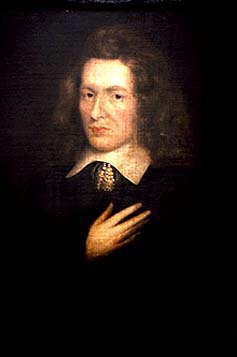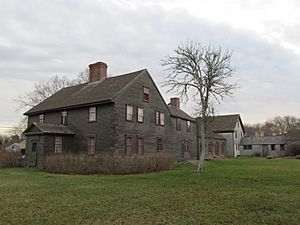Josiah Winslow facts for kids
Quick facts for kids
Josiah Winslow
|
|
|---|---|
 |
|
| 13th Governor of Plymouth Colony | |
| In office 1673–1680 |
|
| Monarch | Charles II |
| Preceded by | Thomas Prence |
| Succeeded by | Thomas Hinckley |
| Personal details | |
| Born | 1628 Plymouth Colony |
| Died | December 18, 1680 (aged 51–52) Marshfield, Plymouth Colony |
| Spouse | Penelope Pelham |
| Children | 4 |
| Signature | |
Josiah Winslow (born around c. 1623 in Plymouth Colony – died 1680 in Marshfield, Plymouth Colony) was an important leader in early America. He served as the 13th Governor of Plymouth Colony. Sometimes, old records also call him Josias Winslow.
Josiah was the son of Edward Winslow, a famous Mayflower passenger and Pilgrim leader. He studied at Harvard College. Josiah became Governor in 1673 and served until 1680. During his time as governor, a major conflict called King Philip's War happened. This war caused big changes for both the English settlers and the Native American people in New England. Josiah Winslow was the first governor of Plymouth Colony who was actually born in one of the New England colonies.
Contents
Josiah Winslow's Early Life

Josiah Winslow's parents were Edward Winslow and his second wife, Susanna White. Susanna had been married before to William White, another Pilgrim. William died in 1621. Susanna and William had two sons, Resolved and Peregrine White, who were also Mayflower passengers. The marriage of Edward Winslow and Susanna White was the very first wedding in Plymouth Colony.
In 1643, Josiah Winslow was chosen as a representative for Marshfield in the general court. Later, in 1656, he took over from Myles Standish as the leader of the colony's military forces.
From 1657 until 1673, Josiah served as an assistant governor. He was also a commissioner for the New England Confederation, which was a military alliance of Puritan colonies against Native American groups. In 1658, he became the major-commandant of the colony's militia. He held this role until he was elected governor in 1673.
Josiah's father, Edward Winslow, helped create the Articles of Confederation for the New England colonies in 1643. When Governor Thomas Prence died in 1673, Josiah became the first governor of the colony who was born in New England.
Leading Plymouth Colony
| Governors of Plymouth Colony | ||
|---|---|---|
| Dates | Governor | |
| 1620 | John Carver | |
| 1621–1632 | William Bradford | |
| 1633 | Edward Winslow | |
| 1634 | Thomas Prence | |
| 1635 | William Bradford | |
| 1636 | Edward Winslow | |
| 1637 | William Bradford | |
| 1638 | Thomas Prence | |
| 1639–1643 | William Bradford | |
| 1644 | Edward Winslow | |
| 1645–1656 | William Bradford | |
| 1657–1672 | Thomas Prence | |
| 1673–1679 | Josiah Winslow | |
| 1680–1692 | Thomas Hinckley | |
One of Josiah Winslow's first actions as governor was to be more understanding towards the Quakers. He released two men, Cudworth and Robinson, who had been jailed for supporting the Quakers, a group that had faced harsh treatment before.
During his time as governor, the first public school was started in 1674–75. Also, in 1680, the colony elected its first Lieutenant-Governor. In 1675, Josiah Winslow was chosen as the General-in-Chief of all the military forces of the United Colonies. He was the first general born in the colonies.
The government also became more prepared for conflict. In 1675, the General Court ordered that armed guards should protect the governor and other leaders during elections and court sessions.
On September 9, 1675, Governor Winslow signed a Declaration of War against the Native American leader known as King Philip.
Understanding King Philip's War
King Philip's War, also called "Metacomet's War," was a major conflict between various Native American groups and English colonists. It lasted from 1675 to 1678. King Philip was killed on August 12, 1676.
The war began on June 20, 1675, when Native Americans attacked colonial homes. Both King Philip and Governor Winslow had allowed a tense situation to get out of control. The attacks and the violence that followed surprised everyone.
Josiah's father, Edward Winslow, had made peace with the Native Americans and treated them with respect. However, Josiah, who became the colony's military commander around 1659, had a different view. He didn't have good relationships with the Native Americans. Over time, the colonists no longer felt they needed the Native Americans for survival. Many younger colonists started to see Native Americans as a barrier to developing the land they now considered their own.
King Philip initially wanted good relations with the English. However, land sales to the colonists increased greatly from the 1650s to the 1670s. This caused a lot of tension.
When Josiah Winslow became governor in 1673, many local Native Americans saw him as someone who represented all the problems in their relationship with the colonists. They felt he was involved in unfair land deals and even the seizure of Native American land.
By the 1650s, attitudes were changing. With only a small part of their original lands left, young Native Americans urged their leaders to act. The second generation of colonists also wanted action. They desired all remaining Native American lands.
King Philip had tried to avoid war for many years. Even in June 1675, he hoped to prevent fighting. But Governor Winslow, who was ill, seemed to make things worse instead of helping Philip control his warriors. Winslow even prosecuted one of Philip's senior advisors for murder, which further angered the Native Americans.
The main reason for the war was Winslow's refusal to see that Philip's problems were also the colony's problems. Many historians believe Governor Josiah Winslow was largely responsible for King Philip's War.
Initially, Governor Winslow had a chance to solve the conflict peacefully. But he didn't take the necessary steps, leading to a major war that might have been avoided. For example, several hundred Native Americans surrendered to authorities in Plymouth and Dartmouth, believing they would be safe. But Winslow and his advisors decided that all surrendered Native Americans should be treated as guilty. Within months, these captured Native Americans were shipped to Spain as slaves.
Josiah and Penelope Winslow's Family
Josiah Winslow married Penelope Pelham around 1651. They had four children:
- An infant, born and died in March 1658.
- Elizabeth, born April 1664, died June 11, 1735. She married Stephen Burton and had three children.
- Edward, born and died in May 1667.
- Isaac, born 1670, died December 6, 1738. He married Sarah Wensley and had two children. Isaac had a successful career in colonial military and government. The Isaac Winslow House was built on the land first owned by Josiah's father, Edward Winslow.

Penelope Pelham was born around 1633. Her parents were Herbert Pelham and Jemima Waldegrave, who came from important families in England. Herbert Pelham was an investor in the Massachusetts Bay Colony and supported new settlements in New England. He came to the colony with his family in 1638 and was involved with Harvard College in Cambridge.
In 1646, the Pelham family returned to England. On the same ship, they met Edward Winslow, who would later become Penelope's father-in-law. Josiah Winslow traveled to England in 1651 to see his father. It is believed that Josiah and Penelope met and married in England that year. They had their portraits painted, which are now at the Pilgrim Hall Museum.
Josiah and Penelope returned to Plymouth in 1655. That same year, Josiah's father died at sea. In the 1660s, the Winslows lived at their family estate called Careswell in Marshfield. Josiah was known for being a refined English gentleman, married to a wealthy and beautiful English wife.
Death and Burial
Josiah Winslow passed away on December 18, 1680, in Marshfield, Massachusetts Bay Colony, at about 51 years old. In his will, he named his wife Penelope as the administrator of his estate. Penelope had a special mourning ring made with a lock of his hair. After Josiah's death, Penelope continued to live at their home, Careswell, with their children Elizabeth and Isaac.
Penelope Pelham Winslow died on December 7, 1703, at age 70. Both Josiah Winslow and his wife Penelope were buried in the Winslow Cemetery in Marshfield. This cemetery also has a memorial for Josiah's father, Edward Winslow, who died at sea. Josiah's mother, Susanna White, and his half-brothers, Resolved and Peregrine White, are also buried there.
Images for kids
-
An early Plymouth document mentioning Josiah Winslow and Governor Thomas Prence.
-
The Isaac Winslow House was built by Josiah Winslow's son, Isaac. It stands on land originally granted to Josiah's father, Edward Winslow.
 | Victor J. Glover |
 | Yvonne Cagle |
 | Jeanette Epps |
 | Bernard A. Harris Jr. |


